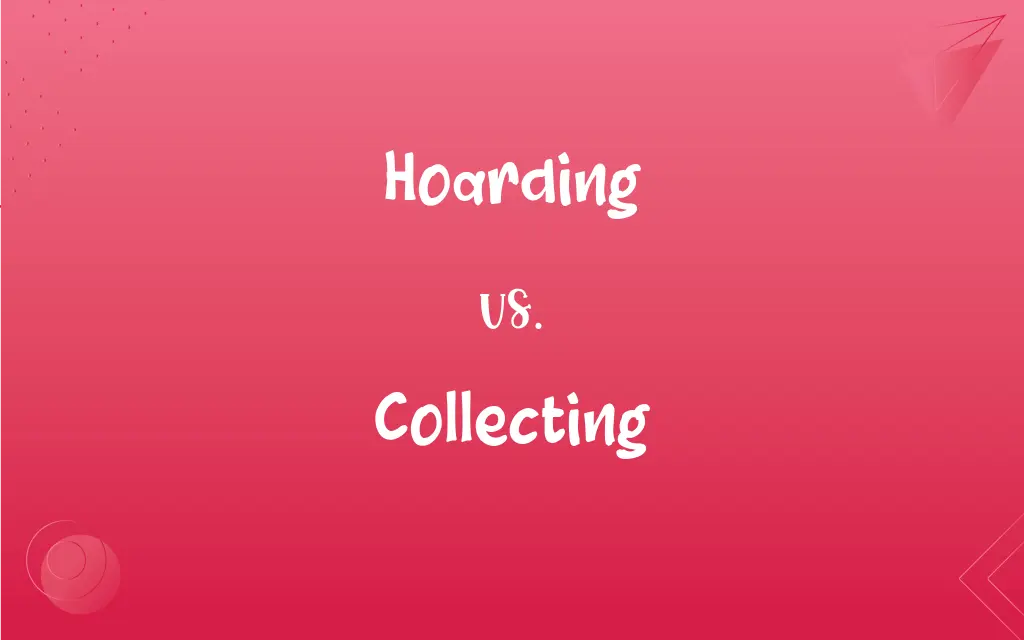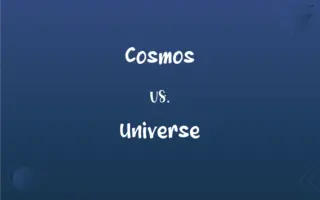Hoarding vs. Collecting: What's the Difference?
Edited by Aimie Carlson || By Janet White || Published on November 21, 2023
Hoarding is the excessive accumulation of items with difficulty discarding, while collecting is the organized and intentional gathering of specific items.

Key Differences
Hoarding typically refers to the overwhelming compulsion to acquire and retain a vast amount of items, often without any particular value or use. On the other hand, Collecting is a deliberate act of accumulating particular items based on interest, value, or theme.
Those involved in Hoarding might struggle with an emotional attachment to their possessions, finding it challenging to part with them even if they're cluttering their living space. In contrast, Collecting is often a well-organized hobby where each item has significance or fits into a broader collection.
Another distinguishing feature is that Hoarding can negatively impact one's living conditions and quality of life, leading to unsanitary or hazardous environments. In the realm of Collecting, enthusiasts take pride in their collections, often displaying them neatly and with care.
Hoarding can sometimes be a symptom of a psychological disorder, where the individual feels extreme distress at the thought of getting rid of items. Collecting, meanwhile, is more about passion, interest, or investment, with collectors often having a clear understanding of the worth and importance of their acquisitions.
While Hoarding is often seen in a negative light due to its association with unhealthy compulsions, Collecting is more socially accepted and can even be seen as a commendable pursuit, celebrating history, art, or other areas of interest.
ADVERTISEMENT
Comparison Chart
Purpose
Often compulsive without clear intent
Deliberate, based on interest or value
Organization
Typically cluttered and disorganized
Generally organized and displayed
Impact on Lifestyle
Can be detrimental, leading to unsanitary conditions
Often a source of pride, enhancing lifestyle
Emotional Aspect
Difficulty discarding due to attachment
Joy in acquisition and sharing of items
Perception
Generally viewed negatively
Viewed as a hobby or passion
ADVERTISEMENT
Hoarding and Collecting Definitions
Hoarding
The compulsion to acquire and keep items excessively.
She couldn't enter her garage due to her hoarding tendencies.
Collecting
The act of gathering items based on a theme or interest.
His collecting of vintage stamps was truly impressive.
Hoarding
Accumulation beyond practical needs or space.
Years of hoarding left him with rooms full of unused gadgets.
Collecting
Organized assembly of specific objects.
His joy in collecting model trains was evident in his detailed displays.
Hoarding
Excessive gathering often linked to emotional or psychological factors.
Therapy helped her address her hoarding behavior.
Collecting
Purposeful acquisition with intent to showcase or invest.
By collecting first edition books, she combined passion with investment.
Hoarding
An inability to discard objects, leading to clutter.
Hoarding old newspapers made his living room impassable.
Collecting
To bring together in a group or mass; gather
The teacher collected the exams.
Hoarding
Retaining items that have little to no value or utility.
His hoarding of empty containers puzzled his friends.
Collecting
To accumulate as a hobby or for study
Collect old coins.
Collect folk tales.
Hoarding
A temporary wooden fence around a building or structure under construction or repair.
Collecting
To call for and obtain payment of
Collect taxes.
Hoarding
Often hoardings An overhanging wooden structure temporarily mounted atop the walls of a fortification to aid in repelling attackers. Also called brattice.
Collecting
To be the site for (an accumulating mass), especially as a consequence of disuse or neglect
My guitar is collecting dust in the corner.
Hoarding
Chiefly British A billboard.
Collecting
To recover control of
Collect one's emotions.
Hoarding
(UK) A temporary fence-like structure built around building work to add security and prevent accidents to the public.
Collecting
To call for (someone); pick up
Collected the children and drove home.
Hoarding
A roofed wooden shield placed over the battlements of a castle and projecting from them.
Collecting
To come together in a group or mass; gather
Sand collected in the crevices.
Hoarding
A billboard.
Collecting
To take in payments or donations
Collecting for charity.
Hoarding
The practice by of accumulating goods.
Collecting
With payment to be made by the receiver
Called collect.
A collect phone call.
Hoarding
A good which is hoarded.
Collecting
A hobby including seeking, locating, acquiring, organizing, cataloging, displaying, storing, and maintaining whatever items are of interest to the individual collector.
Hoarding
(psychology) An anxiety disorder characterized by a compulsive need to accumulate goods and feelings of anxiety or discomfort about discarding such goods.
Collecting
Present participle of collect
Hoarding
Present participle of hoard
Collecting
The act of gathering something together
Hoarding
A screen of boards inclosing a house and materials while builders are at work.
Posted on every dead wall and hoarding.
Collecting
Accumulating items of value or historical significance.
She traveled the world collecting rare coins.
Hoarding
A fence, barrier, or cover, inclosing, surrounding, or concealing something.
The whole arrangement was surrounded by a hoarding, the space within which was divided into compartments by sheets of tin.
Collecting
Gathering items to celebrate art, history, or culture.
Collecting art pieces from local artists supported her community.
Hoarding
Large outdoor signboard
FAQs
Can Hoarding lead to health concerns?
Yes, hoarding can create unsanitary conditions and increase risks like fire hazards.
Does Hoarding have a psychological basis?
It can. Hoarding disorder is a recognized mental health condition.
Is Hoarding limited to tangible items?
Primarily, but it can extend to digital items or even animals in extreme cases.
How does Collecting impact one's social life?
Collecting can be a social activity, connecting enthusiasts with similar interests.
How does one start Collecting?
It often begins with an interest or appreciation for certain items, leading to deliberate accumulation.
How is Collecting different from shopping?
Collecting is targeted and thematic, whereas shopping can be more general.
Are there communities centered around Collecting?
Absolutely, many enthusiasts join clubs or online forums to share their passion.
Why do people engage in Collecting?
Collecting is driven by passion, interest, investment, or appreciation for specific items.
Do all collectors seek to monetize their Collecting?
No, while some view collecting as an investment, others do it purely for passion.
Can Hoarding be a genetic trait?
Some studies suggest a familial predisposition to hoarding behaviors.
What drives Hoarding behavior?
Emotional attachment, anxiety, and difficulty discarding are common in hoarding.
Is Collecting always an organized activity?
Typically, yes. Collecting involves intentional and organized accumulation of items.
Is intervention effective for severe Hoarding?
With a combination of therapy and support, interventions can be effective.
Can Collecting be a profitable venture?
Depending on the items, collecting can be profitable, especially with rare or valuable acquisitions.
Is there a stigma around Hoarding?
Unfortunately, there can be misconceptions and stigma associated with hoarding behaviors.
Do museums engage in Collecting?
Yes, museums actively collect items of historical, cultural, or artistic significance.
Are there exhibitions dedicated to Collecting?
Yes, there are exhibitions and conventions where collectors showcase and trade their items.
Can Hoarding be treated?
Yes, through therapy and support, hoarding behaviors can be addressed.
Can Hoarding affect relationships?
Yes, hoarding can strain relationships due to its impact on living conditions.
What's the first step in addressing Hoarding?
Recognizing the issue and seeking professional help is often the initial step.
About Author
Written by
Janet WhiteJanet White has been an esteemed writer and blogger for Difference Wiki. Holding a Master's degree in Science and Medical Journalism from the prestigious Boston University, she has consistently demonstrated her expertise and passion for her field. When she's not immersed in her work, Janet relishes her time exercising, delving into a good book, and cherishing moments with friends and family.
Edited by
Aimie CarlsonAimie Carlson, holding a master's degree in English literature, is a fervent English language enthusiast. She lends her writing talents to Difference Wiki, a prominent website that specializes in comparisons, offering readers insightful analyses that both captivate and inform.






































































